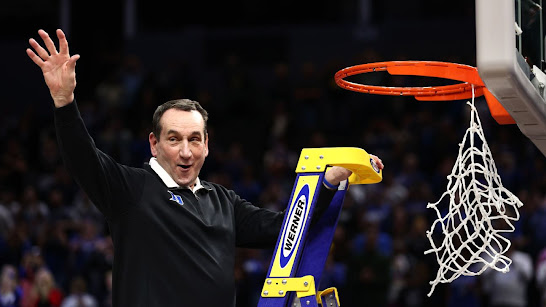Count Your Own Scoreboard
 |
| Photo Courtesy of ESPN |
On Saturday, April 2, 2022 legendary Duke Men's Basketball Coach Mike Krzyzewski walked into the Caesar’s Superdome in New Orleans for a Final Four matchup against rival North Carolina. Ten months prior Coach K announced that the 2021-22 season would be his final campaign.
A win last week would be the cherry on top to a magical career that encompasses 1,202 career wins, 13 Final Four appearances, and 5 NCAA Championships. Instead, North Carolina defeated Duke 81-77 in an instant classic.
"I've said my entire career that I wanted my seasons to end where my teams were either crying tears of joy or tears of sorrow,” Coach K said after the game. “Because then you know they gave everything."
Coach Krzyzewski touched on a subject that extends beyond the realm of sports, losing. In American society we treat losing with a negative connotation. We avoid the “losing” and gravitate towards the “winning,” because we have decided winning must mean success.
My senior year of high school I coached a freshmen girls basketball team. At the beginning of the season we lost a close game to a team we shouldn't have even been in the game with. In simple terms, they were just better than us.
In the locker room afterward, the girls hung their heads. I went to the whiteboard and drew three checkboxes. I broke the silence and loudly asked, “Did you play hard?” I received a couple raised heads and got a quiet “yes.” I enthusiastically checked off one of the boxes.
I followed with “Did you get better?”
A couple more heads popped up and responded “yes.” I checked off another box.
“Did you learn something?”
At this point I had the whole team's attention and the energy in the locker room had changed. I got one final yes and checked off that third box.
“So why in the world would you let the scoreboard decide whether you lost and hang your head? You did everything you could and got better in the process. That’s being successful. That’s being a winner.”
As a coach I live by the saying “Control your own scoreboard.” That means checking off those three boxes every time you play. The one message I have the toughest time getting across to youth athletes is the fact they have no control over the physical scoreboard. You can’t control what the officials will call, and you can’t control how well the other team plays.
When I say that, I always get confused looks.
“Can’t you play better defense, and make more shots?”
My response is always, “You’re absolutely right. You can control the effort you put in every time you step on the floor, field, court … etc. Although, whether you like it or not there will be a team that is just better than you on a given day. That’s why you only worry about your own scoreboard.”
When I coach, I speak from experience. I understand the lows of riding the bench, and the highs of being in the starting five. Growing up with a coach as a father also helped me understand important parts of the game. My dad also understood that the most important parts of the game I needed to learn on my own.
When I first started playing competitive basketball in eighth grade my dad told me, “You’re starting late. If you want to play you’re going to have to work for it.”
I played maybe 10 combined minutes all season, one of the most humbling experiences for me. I didn’t get along with the coach. He was a young guy who just started coaching and only played the best players. He had a “Get better or get left behind mentality.” That year I learned the importance of hard work.
My sophomore year of high school I got kicked out of practice twice because I argued with the coach too much. I played for my dad my freshmen year, now I had to play under a different coach. We were night and day when it came to anything about the game of basketball.
One day he sat me down in his office and said, “Carsyn, you’re smart, but you think you’re right all the time.” I believe this might have been the only thing he and I agreed on. That year I learned about respect.
Ironically, two years later the same coach hired me onto his staff to coach his freshmen girls basketball team.
My junior year of high school, I got cut on the last day of basketball tryouts. That year I learned about losing. I worked hard, challenged myself, and learned to respect others. I still fell short.
As a junior in high school, it doesn’t take much for your world to crumble. Basketball was my world, and a meteor had just made impact. Tears flowed down my face. My dad walked into my room and said, “I know you don’t want to hear this, but you should ask yourself: Did you work hard? Did you get better? Did you have fun while doing it? That’s all you can control.”
That same year, the head men's coach at the high school said I should volunteer as a seventh-grade basketball coach. I still loved the game and I knew my days of playing were behind me. As the saying goes, when one door closes another one opens. I loved every second of that year. I learned far more about the game in one year of coaching than I ever did playing.
The greatest part about it was … we only won one game.
Coaching middle school basketball is nothing short of frustrating. It requires patience and the understanding you will lose far more than you win. It also teaches someone how satisfying coaching can be when you get it right.
The one win came in the last game of the year. I told my kids all year that I never cared about whether we won or lost, but that we checked off our three boxes. Not only did they do that, but they shocked me by putting together everything we worked all year on.
I knew I found my niche in coaching after that year. Four years later, I’m an assistant coach at the college level. I’ve now coached from third grade all the way up to where I’m at now. Although the skill level drastically changes, my message never does.
Did you play hard?
Did you get better?
Did you learn something?
That’s being successful.
That’s being a winner.


Comments
Post a Comment